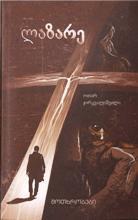Otar Jirkvalishvili’s collection of stories Lazarus is a book based on parodies of intellectual prose, on linguistic games and on a system of post-modern quotations. The stories are characterized by a powerful linguistic dynamism and expressiveness. In some stories the language’s technical balance is disrupted, to make room for an organized aesthetic space in which linguistic games can take place. Mostly, these are extremely politically incorrect, a deliberate attack on those areas of consciousness which seem to us to be best protected (and, as it turns out, not all that well protected in any case). The collection’s first story ‘Lazarus’ tells us about Lazarus who, as the Gospel says, Jesus Christ raised from the dead. The author describes Lazarus’s life and his second death after his resurrection. The main thread of the text is that Lazarus has doubts about whether he had really died. The surrealist story ‘A Sweet’ is a bitter satire on fanaticism and, at the same time, an elaborately constructed text whose reflexions, in which philosophical, religious, medical or journalistic styles of language follow each other, consequently with ironic rhetoric and with an absence of any sharply defined plot line, and so on. The main character has lost any feeling for reality, because he has appeared miraculously from nowhere (his parents couldn’t have a child and were praying for one); later, the Georgian patriarch Ilia II baptised him and, when he was five years old, he asked a granddad outside a shop to buy him a sweet: the granddad told him, ‘Son, if I buy you a sweet you will forget a few hours after you’ve eaten it, but if I don’t buy you one, you’ll remember for the rest of your life.’ After that the character’s life is wholly shaped by this incident: it is in chaos and he cannot understand where the limit between the real and the unreal lies. The story ‘The Priest’ is an example of playing with dialect. The first and last paragraphs in the story and in form are identical. The final paragraph is at the same time the first and not the first, because the content that is inserted in the course of reading rises to a qualitatively higher level, turns back on itself and we are left with the impression that it is, and yet is not, the conclusion. In ‘The Priest’ the language merges completely with the plot and continues much longer than it does, while the fact of the story’s outline creates the content in itself. It is as if the reason for writing the text was for something not to be written. There are five other stories in the collection, and they completely complement or continue one another stylistically. The characters sometimes are conventions of each other, more significant allusions, reminiscences and interpolations, which determine the flow and semantics of the narrative. The amplitude of the extreme feelings is unexpected and always changeable, which sends us on a journey into the author’s conscious and unconscious mind, something fragmentary and eclectic. What is relevant to this collection is the metaphor of a double angel.
‘Does the serious work of an intellectual, his persistent and sometimes obsessive repetition of the same work put intellectuals off, or not, from this prose? Fortunately, the outcome is that OtarJirkvalishvili’s “intellectualism” distracts you, thanks to the self-destructive reproductions of elite pathos, and what we are left with is pure language, undiluted and sometimes indomitable.’
Paata Shamugia, poet, critic
‘Otar Jirkvalishvili doesn’t write literature, nor should he, that can be ‘read in one sittings’. To read his texts, metaphorically speaking, you need to have several sittings.’
Shota Iatashvili, poet, critic
‘Baudrillard says that a man who is playing the part of a madman to perfection is himself mad. I think that OtarJirkvalishvili, who produces ideally perfect parodies of intellectual prose, is at the same time a parody writer and an intellectual writer.’
Lexo Doreuli, critic
Extract will be available soon
In case of using the information, please, indicate the source.
